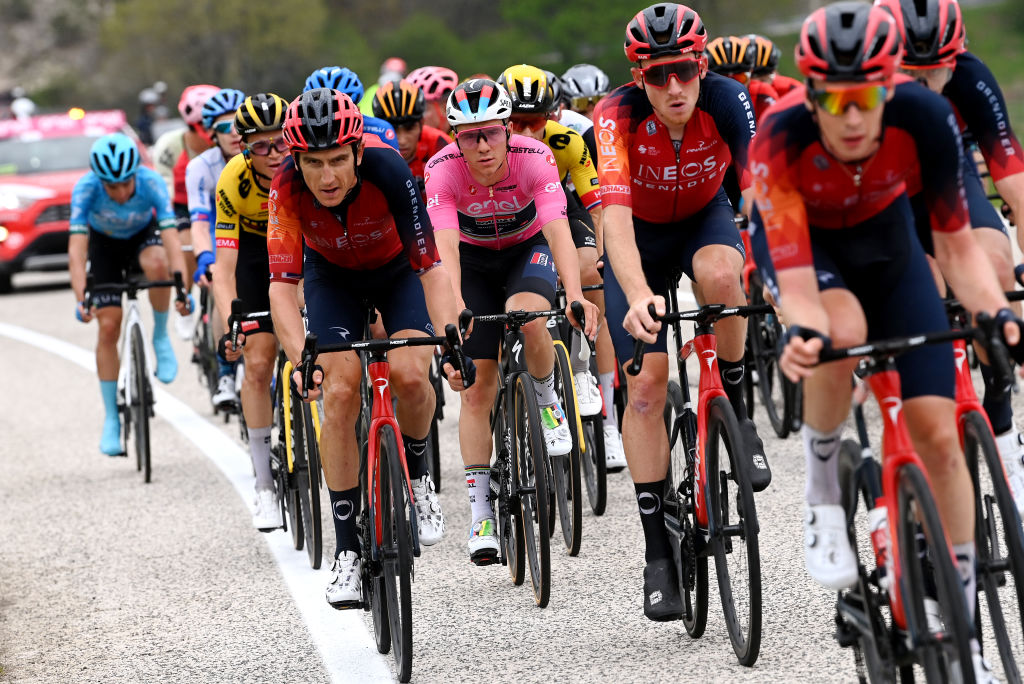Ineos pressure isolates Remco Evenepoel on first Giro d'Italia mountain stage
'It was more about staying in control' Thomas says of Ineos Grenadiers' collective strength on Giro d'Italia stage 4 final climb

Before stage 4 of the Giro d’Italia and the near-summit finish of Lago Laceno, there was much debate if there would or would not be a GC battle. But the one notable takeaway amongst the overall favourites was that Ineos Grenadiers were collectively as strong on the climbs as they had been in the opening time trial.
The second category ascent of Colle Molella that effectively concluded stage 4 is nowhere near the level of difficulty of the Gran Sasso and the Alps and Dolomites in the second and third week of the Giro.
But it was notable that even as Remco Evenepoel’s last three Soudal-QuickStep support riders on the climb - Mattia Cattaneo, Jan Hirt and Louis Vervaeke - dropped off the pace, Ineos Grenadiers almost instantly had their trio of pacemakers on the front.
Hard work by Laurens de Plus, Pavel Sivakov, and Thymen Arensman helped squeeze the gap down on stage winner Aurélien Paret-Peintre (AG2R-Citroen) and new pink jersey Andreas Leknessund (DSM) down to just under two minutes by the finish and simultaneously maintained the front group at around two dozen as it sped over the top of the Molella and down to Lago Laceno.
But as Geraint Thomas, now sixth at 1:26, told reporters at the finish, even if the idea of shrinking the gap to the point where Remco remained in the lead was at the back of his mind, the main goal was simply to keep the front peloton under control.
“I wasn’t that bothered if we rode or not, we were just staying in a good position,” Thomas explained. “We were just staying in a good position, and we were suddenly on the front, and it was - let’s just keep going and see what happens.
“I did ask what the time gap was because it would have been nice to have flicked him [Remco] and brought the time down so he kept the jersey. But it was more about staying in control, we all felt pretty good, and we had numbers, so it was good.”
The latest race content, interviews, features, reviews and expert buying guides, direct to your inbox!
Thomas was one of the few riders present that knew the climb from the previous ascent in the Giro, riding it in 2012 when he was using the Italian Grand Tour as a build-up for racing on the track in the London Olympics - where he took gold in the team pursuit.
That year he finished 124th, 16 minutes down, but 11 years on and with his eye firmly on the GC ball, Thomas said despite various technological distractions, he was satisfied with his performance on the stage and the climb itself.
“My bracket on which my Garmin - which tells me the time and distance and speed and everything - came off, so I was riding blind for a bit, and my bike seemed to be clicking, too. It was one of those days where I seemed to be concentrating on everything but the race,” he said.
“But yeah, it was all good, it was nice to get a decent day in the legs instead of steady all day and then a big explosion at the end,” as happened on Monday at Melfi, with its series of small punchy climbs after hours of racing on the flat.
As for what his legs told him, he said that as yet, it’s too soon to say how he felt for sure and that the second week would provide a more definitive verdict, "for the moment, it's OK".
The Gran Sasso will be the next battle, he recognised, but after two days of steady rainfall, other, more unpredictable, factors might yet make a difference.
“You never know - if the weather stays like this, anything can happen,” he warned, “so we’ll just take it on day by day and not look too far ahead.”
Alasdair Fotheringham has been reporting on cycling since 1991. He has covered every Tour de France since 1992 bar one, as well as numerous other bike races of all shapes and sizes, ranging from the Olympic Games in 2008 to the now sadly defunct Subida a Urkiola hill climb in Spain. As well as working for Cyclingnews, he has also written for The Independent, The Guardian, ProCycling, The Express and Reuters.
